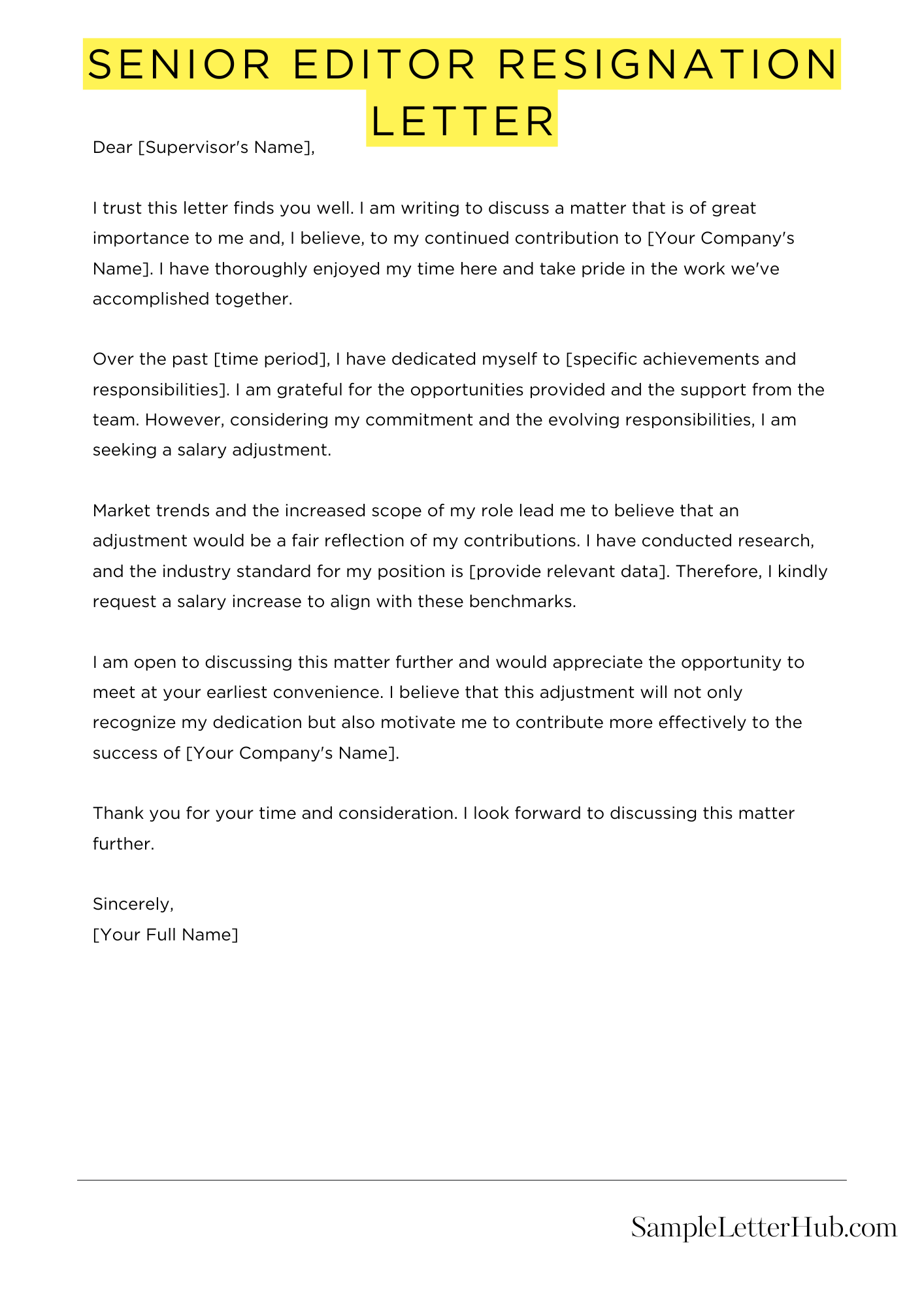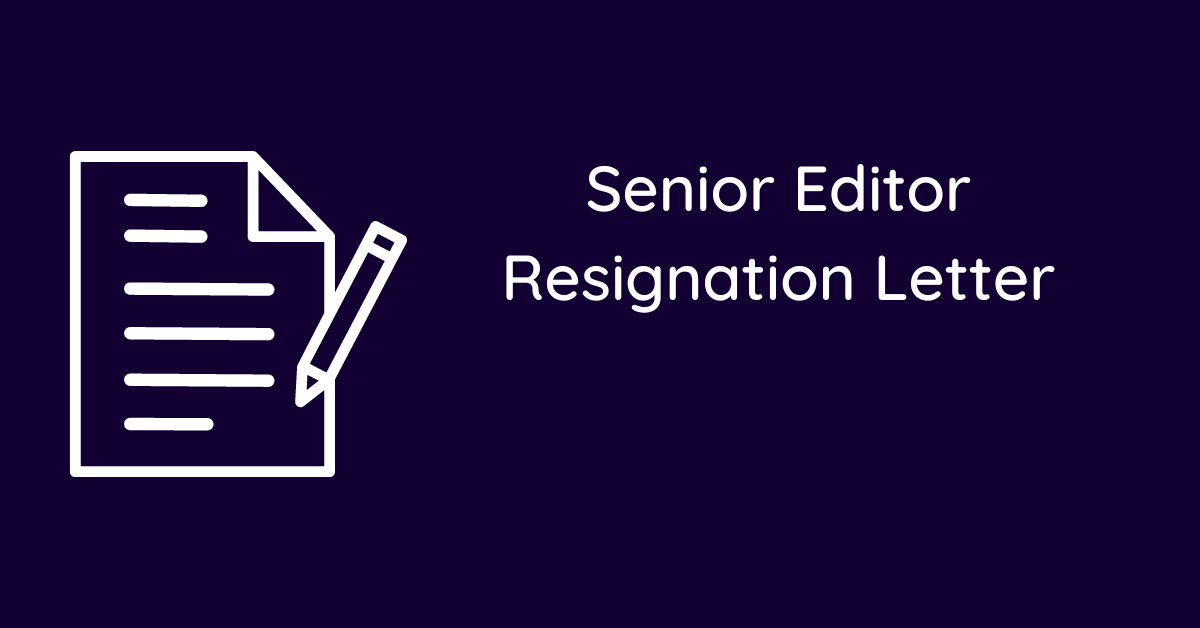In this article, we’ll share an example of a senior editor resignation letter to help you craft your own. When it comes to leaving a job, a clear and professional resignation letter is essential. It should politely and humbly explain your decision to move on.
Resignation letters should be tailored to your specific situation. However, there are some general guidelines you can follow. First, be sure to state your name, position, and the date you’re resigning. Next, express your gratitude for the opportunity to work at the company. Finally, offer to help with the transition in any way you can.
Below, we’ve included a template senior editor resignation letter that you can use as a starting point. Feel free to adapt it to fit your own needs.
Senior Editor Resignation Letter
Dear [Recipient Name],
Please accept this letter as formal notification that I will be resigning from my position as Senior Editor at [Company Name], effective two weeks from today, [Date].
During my tenure here, I have been honored to work alongside a talented team of professionals and contribute to the success of the company. I have gained invaluable experience and am grateful for the opportunities I have been given.
I wish you and [Company Name] all the best in the future.
Sincerely,
[Your Name]
Short Senior Editor Resignation Letter Sample
Please accept this letter as formal notification that I am resigning from my position as Senior Editor at [Company Name]. My last day of employment will be [Your Last Day]. Thank you for the opportunity to grow and learn during my time here. I wish you and the company continued success. I am happy to assist in the transition process to ensure a smooth handover of my responsibilities.
I wish you all the best with your senior editor resignation letter.
When it’s time to say farewell, expressing your gratitude and best wishes can make the transition smoother:

How to Write a Senior Editor Resignation Letter
1. Start with a Formal Introduction
Begin your letter with a formal salutation, such as “Dear [Manager’s Name].” Clearly state your intention to resign from your position as Senior Editor, providing your last date of employment.
2. Express Gratitude and Appreciation
Take this opportunity to express your gratitude for the opportunities and experiences you’ve gained during your time at the company. Highlight specific projects or initiatives that you’re particularly proud of.
3. State Your Reasons for Leaving
Be brief and professional when explaining your reasons for leaving. Avoid being negative or critical. Instead, focus on your personal growth and aspirations. For example, you could mention that you’re seeking a new challenge or that you’re pursuing a different career path.
4. Offer to Assist with the Transition
Demonstrate your professionalism by offering to assist with the transition during your notice period. This could include training your replacement or providing guidance on ongoing projects.
5. End with a Positive Note
Close your letter on a positive note, expressing your well wishes for the company’s continued success. Thank your manager again for the support and guidance you’ve received.
6 Questions and Answers on Senior Editor Resignation Letters
When it comes to writing a senior editor resignation letter, there are certain frequently asked questions that arise. Here are six of the most common questions and their answers to help you craft a professional and effective resignation letter:
1. What should I include in my resignation letter?
Your resignation letter should include the following key elements:
- A clear statement of your intent to resign
- Your last date of employment
- A brief expression of gratitude for the opportunity to work at the company
- Any relevant details about your departure, such as your reason for leaving or any plans for the future
2. How should I format my resignation letter?
Your resignation letter should be formatted in a professional and concise manner. Use a standard business letter format, including your name, address, date, and the recipient’s name and address. Keep your letter brief and to the point, and use clear and concise language.
3. What is the proper tone for a resignation letter?
The tone of your resignation letter should be professional and respectful. While it is important to be clear and direct about your decision to leave, it is also important to maintain a positive and appreciative tone. Express your gratitude for the opportunity to work at the company and wish your colleagues well in the future.
4. Do I need to give a reason for leaving in my resignation letter?
It is not necessary to provide a reason for leaving in your resignation letter. However, if you feel comfortable doing so, you can briefly state your reason for leaving. Be honest and professional, and avoid being negative or critical of the company.
5. How much notice should I give?
The amount of notice you should give depends on your company’s policies and your relationship with your employer. It is generally considered good practice to give at least two weeks’ notice, but you may want to give more notice if you have a particularly close relationship with your employer or if your departure will create a significant disruption to the company.
6. What should I do after I submit my resignation letter?
After you submit your resignation letter, it is important to maintain a professional attitude and continue to perform your job duties to the best of your ability. You should also be prepared to answer any questions your colleagues or supervisors may have about your departure.
Before making the decision to resign from your job, it’s essential to consider the legal aspects:
Understanding your emotions after quitting your job is important. Explore why you might be feeling sad:
Related
- Resignation letter sample
- Forced resignation letter
- Resignation letter due to going abroad
- Resignation letter due to marriage
- Resignation letter due to other opportunity
- Resignation letter due to mistake

